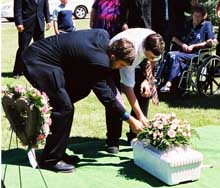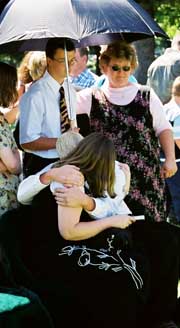Parents seek ways to cope with death
The death of a child can take its toll on parents and other members of the family.
There is help, though, for those who need it.
In July, the Jensen family had such a loss. Michael and Shay Jensen lost their daughter, Julie Kay, to complications from prematurity.
After removal of her colon and parts of her intestine, Julie Kay couldn’t survive.
“The doctors said if she lived to be a year old she would have to have a small bowel transplant,” Shay said.
The Jensen family is just taking it one day at a time, trying to deal with grief and the loss of their new family member.
Trent Wentz, director of Adult Services at Bear River Mental Health, said there is nothing more difficult for a parent than the death of a child.
“An event like this opens up the field for depression, and [the parents] need to be able to talk about it,” he said.
Many different counseling centers focus on the grieving family’s ability to talk about the loss. They can talk with family, friends, religious leaders or neighbors, Wentz said.
Shay said her religion, The Church of Jesus Christ of Latter-day Saints, has been the biggest support for her an her husband.
“Being a part of the LDS faith has helped more than anything,” she said. “It gives a future to look forward to and a purpose.”
According to a report from The Compassionate Friends, a national, non-profit organization, a baby’s death may cause parents to direct their concerns toward God and re-examine their beliefs.
“For many, however, faith provides support and often helps parents to accept the unacceptable,” the report stated.
Many organizations, like The Compassionate Friends, exist to help families cope with death.
“There may not be many groups specific [to helping with the death of child] in Cache Valley, but there are those that can help with depression or pain and grief,” Wentz said.
These groups help people through the grieving process.
“If [the survivors] hide the pain, it will just come back and bite them as depression,” he said.
One major mistake friends of grieving families make is to try and offer advice, Wentz said.
“Advice isn’t always the best situation,” he said. “They just need someone to listen to them and let them talk.”
According to the report, friends, relatives and co-workers may not understand the pain the parents are feeling; they will offer clichés or platitudes as a source of comfort. Statements like, “You’re still young enough to have more children” or “You’re lucky you did not bring the baby home from the hospital” should be avoided.
The report advises parents to let family and friends know how important the baby was to them and ask them to be supportive just by listening.
The Sharing Place, an organization in Salt Lake City, focuses its help for families on letting them talk about their experiences in organized support groups.
“The premise is that it is a support group, and we try to focus on what is called reflective listening,” said Bryan Taylor, administrative director for the organization.
Reflective listening involves letting the survivors, primarily the siblings of those who have passed away, talk with and help each other, Taylor said.
“There is no right or wrong answer,” he said. “They just need to talk about it and this allows children to express their feelings.”
If grief isn’t dealt with, Taylor said, it can manifest itself in all other aspects of life, namely school, work, family interactions and other social issues.
Shay said she has found a lot of help in talking to friends and family who have gone through similar situations.
“I have two friends … and my grandmother who have all been through this same thing,” she said. “There is a special bond between mothers who have lost children that helps us all cope. We all know how it feels.”
Wentz offered some tips to help parents who are dealing with the loss of a loved one.
– The parents need to stay active.
“People who hibernate and hide from everything are only hurting themselves,” Wentz said.
– The parents need to open up a little to others and try to lay down new memories.
– The parents need to achieve some balance between maintaining memories and continuing with normal life.
“The biggest thing for them to remember is that every time there is a tragedy of this kind, somebody is left,” Wentz said. “It is natural for people to grieve.”
According to The Sharing Place, signs of grief may include depression, moodiness, nightmares, asthma, anxiousness, tearfulness, high blood pressure or forgetfulness. If any of these symptoms or other unusual behavior continues and becomes unbearable, it is recommended to seek professional guidance.
The Sharing Place is located in Salt Lake City and can be reached at (801) 466-6730.
For parents who cannot make the trip to Salt Lake, there is a foundation in Ogden similar to The Sharing Place. Barbara Noris, director of The Family Summit Foundation, said many families from Logan and Cache Valley go to Ogden to find solace during their grief.
The foundation is set up in a way similar to The Sharing Place. Both are non-profit organizations run mostly by volunteers. The services are free to the families in need and they have regular meetings and support groups.
According to information from the foundation, the way parents grieve will vary quite dramatically. The father may be less emotional, while the mother will feel very attached to the baby.
“Friends will usually ask Dad how Mom is feeling, rather than asking him how he is doing. [Such neglect of his feelings] encourages denial of his grief,” the document stated.
It also described the mother as expressing her feelings more, but if the dad is uncomfortable with tears, Mom may feel like she must restrict her grief to privacy and friends.
“Talking to others who are willing to listen may help take the load off each other when you are both feeling down,” according to the document. “It’s still vital to talk to each other, but if you need to talk more than your partner, find someone you trust and talk, talk, talk.”
The Family Summit Foundation can be reached at (801) 435-1127.
-jacobomoon@cc.usu.edu

Jonathan and Richard Simmons place carnations on their niece´s casket.

Shay and Mike Jensen embrace after the dedication of their daughter´s gravesite. (Photos by Amy Fuller)

